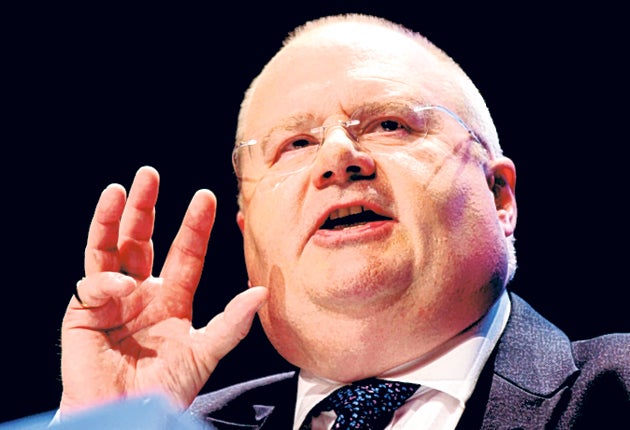Andrew Grice: In the end, it was all a bit less bloody than they feared at start
Contrary to expectations, the Star Chamber did not have to hold any minister's feet to the fire

Your support helps us to tell the story
From reproductive rights to climate change to Big Tech, The Independent is on the ground when the story is developing. Whether it's investigating the financials of Elon Musk's pro-Trump PAC or producing our latest documentary, 'The A Word', which shines a light on the American women fighting for reproductive rights, we know how important it is to parse out the facts from the messaging.
At such a critical moment in US history, we need reporters on the ground. Your donation allows us to keep sending journalists to speak to both sides of the story.
The Independent is trusted by Americans across the entire political spectrum. And unlike many other quality news outlets, we choose not to lock Americans out of our reporting and analysis with paywalls. We believe quality journalism should be available to everyone, paid for by those who can afford it.
Your support makes all the difference."Where on earth is he? In the quad?" civil servants across Whitehall barked frequently in recent weeks when their political masters went missing and were running late.
"The quad" are the four most powerful people in the Coalition Government – David Cameron, George Osborne, Nick Clegg and Danny Alexander, the Liberal Democrat Treasury Chief Secretary. They were all on the front bench together as the Chancellor announced his spending review in the Commons yesterday.
This foursome took the key political decisions, and agreed the inevitable trade-offs between the Conservatives and the Liberal Democrats. The most significant change since the emergency Budget in June was a further raid on the welfare budget, which made the cuts for other Whitehall departments smaller than the 40 per cent worst-case option facing some ministers.
The quad decided to leave unscathed the winter fuel allowances, free TV licences and bus travel for pensioners. Iain Duncan Smith, the Work and Pensions Secretary, was prepared to restrict them, but Mr Cameron was reluctant, because he had promised to retain them in the run-up to the May election.
Child benefit was also much debated by the quad. The figures announced at this month's Tory conference assumed that it would be withdrawn for 16- to 19-year-olds, although that was not disclosed when Mr Osborne announced it would be scrapped for families with a higher rate taxpayer from 2013. At the end of last week, the quad decided that another row over child benefit was not worth it, and agreed to retain it for 16- to 19-year-olds.
The Cabinet's Star Chamber, chaired by the Chancellor, played an important role by deciding cap-ital spending budgets such as building projects for every department. But, contrary to expectations, it did not have to hold any minister's feet to the fire because they all settled with the Treasury. "The threat of an inquisition concentrated people's minds," said one official.
Who are the Cabinet's biggest winners? Michael Gove, the Education Secretary, is the main beneficiary of the decision to hit welfare harder. In June, his schools budget looked vulnerable when compared to the already "protected" areas of health and international development but won a surprise reprieve.
Philip Hammond, the Transport Secretary, secured a surprisingly good deal for his department's capital projects, the big winner of the Star Chamber's beauty contest. Vince Cable, the Business Secretary, took a hit on universities, but his gloomy demeanour was lifted by a last-minute reprieve for the science budget as Mr Osborne accepted the need for a more credible economic growth strategy.
The most spectacular spat was between Liam Fox and Mr Osborne, irritated by the Defence Secretary's campaign against the Treasury's 10 per cent cuts demand. Mr Fox shaved it down to 8 per cent, seen as a score-draw in Whitehall.
Mr Duncan Smith clashed with the Chancellor early in the game but is happy enough after winning approval for his universal working age benefit, a huge changethat will eventually dismantle Gordon Brown's tax credits.
The biggest loser was the Communities and Local Government Department. And yet Eric Pickles, the minister in charge, is a happy bunny. He settled early with the Treasury, safe in the knowledge that many of the painful decisions will be "devolved" to local authorities. Theresa May, the Home Secretary, may find it harder to escape the blame for cuts in the police budget.
One factor that made the spending round easier than expected was that Whitehall was geared up for cuts. There was less resistance than ministers expected from the Civil Service, which knew that many of the savings would have been needed if Labour had retained power.
"It was less bloody than anyone thought at the start," one Cabinet minister said yesterday. "The huge scale helped rather than hindered because everyone needed to do their bit. In a more traditional spending round, there would have been more Cabinet squabbles."
Join our commenting forum
Join thought-provoking conversations, follow other Independent readers and see their replies
Comments